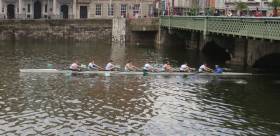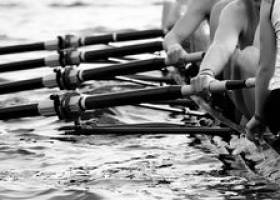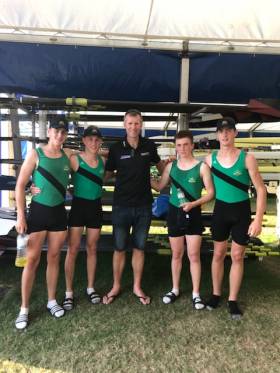Displaying items by tag: Trinity
Mixed Results for Trinity Crews in Colours Races Coin Toss
It was mixed results for Trinity rowing crews in the coin toss for the annual Colours Boat Races yesterday (Sunday 27 February).
Round Ireland sailor and adventurer Mark Pollock was on hand to flip the coin at the steps of TCD’s Dining Hall, with the Dublin University Boat Club losing the toss for the men’s race — they will take the south station for the Gannon Cup and Dan Quinn Shield against UCD Boat Club.
Trinity’s women faired better, with the Dublin University Ladies Boat Club winning their toss — they chose to race on the south station for the Corcoran Cup and the Sally Moorhead Trophy against UCD’s women.
The 2022 Colours Boat Races, which return after a two-year break amid the COVID-19 pandemic, take place on the River Liffey from O’Connell Bridge to St James’ Gate on Friday 18 March.
Davis Of Lee Valley the Irish Junior Champion at Fourteen
#Rowing: Holly Davis gave the crowds a sensational result at the Irish Championships. The Lee Valley girl came through a good battle with Eabha Benson of St Michael's, to pull away and win. The remarkable thing is that Davis is just 14. She does not turn 15 until January 10th next year, leaving her with four years at Junior level.
The men's junior coxed four also electrified the crowd: Colaiste Iognaid and Enniskillen duked it out down the course. The Galway crew got away to win as their emotional supporters roared them on.
Youth was the theme of this regatta: Kevin O'Donovan, who is a junior, won the club single, while Anna Tyther, also under 18 teamed up with Zoe Hyde to win the intermediate double for Killorglin.
The three other titles on offer in this first Saturday session went three different ways: Commercial's strong senior men's programme was on show as they won the men's quadruple; Cork had a fine win in the intermediate men's eight; Trinity's A crew won the women's novice eight.
UCD Fours Best at Metro Regatta
#Rowing: UCD fours won on the double at Metro Regatta today. The club in blue and saffron took the Division One men's coxless four in a battle with Commercial, while their coxed four also won. Bann's junior 18 eight were the top women's crew, while the women's quad and coxed four from Commercial also won. Killorglin's Rhiannon O'Donoghue and Anna Tyther, both outstanding juniors, were the fastest double. The men's single saw Kealan Mannix of the University of Limerick take the honours in this 150th anniversary regatta, ahead of Niall Beggan of Commercial. Trinity's Mark Quigley and Adam Browne won the men's pair.
Bann Finish Well at Trinity Regatta
#Rowing: Bann closed out the day with two wins at Trinity Regatta. Aaron Christie won the last race of the day, the men's intermediate single. In the previous race, the Coleraine club's women's club eight beat KSRV Njord convincingly - it made up for the earlier women's junior 18 eight final, in which Bann had crossed first but been disqualified.
The men's club eight went to the hosts, who had taken the day in hand early on by winning the men's senior eight. Their women's club, DULBC had won the novice eight.
Commercial were big winners on the day, racking up victories in the men's senior coxed four and pair and the women's and men's club coxed fours. Michael Maher beat clubmate Niall Beggan in the men's senior single on a disqualification.
Neptune won the men's intermediate coxed four and the women's senior double, while Brian Colsh of Sligo took the men's junior 18 single sculls.
#Rowing: The hosts won the men's senior eights title at Trinity Regatta today. The Trinity/Lady Elizabeth crew had a length and a quarter to spare over Blue Star, a British crew which featured Scott Durant, an Olympic gold medallist, along with former Ireland internationals Cormac Folan and Niall Kenny.
The men's senior singles went to Michael Maher after a disqualification. The race featured a clash between the two Commercial men, after which Niall Beggan was disqualified.
The women's novice eight gave DULBC a chance to show their mettle. They raced Neptune in the final and won well. Bann's women's junior 18 eight looked strong and crossed the line ahead of Graiguenamanagh - but Bann were disqualified for not staying the right side of a buoy.
Brian Colsh of Sligo continued his good run by taking the men's junior 18 single, while Galway beat Blackrock in the men's junior 16 eights final.
UCD take Gannon Cup after Tough Battle
#Rowing: UCD won the Gannon Cup for senior men and Trinity the Corcoran Cup for senior women at the Colours Races in Dublin today.
Trinity lead early in the Gannon, but once the crews came through Grattan Bridge, UCD pushed into the lead. The lead stood at one length through the next four bridges, but Trinity whittled it to two-thirds from there, making for a good finish. UCD held on to win.
Trinity were outstanding winners of the Corcoran Cup. They carved out a big lead early on and went on to win easily.
UCD’s novice women also built on a good start to win the Sally Moorhead trophy, while Trinity won the men’s novice race and took the Dan Quinn Shield.
Colours Races 2019, Dublin
Gannon Cup (Senior Men): UCD (Rob Brown, Jack Stacey, Andrew Goff, Shane O’Connell, Thomas Earley, Andrew Kelly, Cameron Murphy, David O’Malley; cox: Orlagh Reid) bt Trinity 2/3 l
Corcoran Cup (Senior Women): Trinity (Anna Mangan, Ellen Clohessy, Ruthie McHugh, Jane Hogg, Aoife Corcoran, Erika Deasy, Miriam Kelly, Aoife McGranaghan; cox: Clare White) bt UCD easily
Dan Quinn Shield (Novice Men): Trinity bt UCD 3l
Sally Moorhead Trophy (Novice Women): UCD bt Trinity 3l.
Commercial and Trinity Shine at Erne Head of the River
#Rowing: The senior eights from Commercial and Trinity topped the men’s and women’s rankings at the Erne Head of the River in Enniskillen today. Commercial were the fastest crew and came home faster than Trinity’s men’s senior eight, while Enniskillen’s junior women’s eight were the second-fastest women’s crew. The host club’s junior 18 men’s eight were also fastest in their class – they were fifth overall.
There were strong winds throughout the race. Despite the conditions, this was the biggest Erne Head.
Erne Head (provisional results); 1 Commercial A men’s senior eight 19 mins 32 seconds, 2 Trinity mens sen eight 19:56, 3 UCD men’s sen eight 20.11.2, 4 Commercial B men’s sen eight 20.14.9, 5 Enniskillen men’s junior 18 eight 20.35.9, 6 NUIG men’s club one eight 20:56.5. 18 Trinity women’s senior eight 22.24.2; 20 Enniskillen junior women’s eight 22:35.8.
Commercial Best at Dublin Head of the River
#Rowing: Commercial took first and second at the Dublin Head of the River today. UCD took third. The fastest women’s crew was Trinity's senior eight and Commercial were the fastest women's junior 18 eight. Neptune’s boys formed the fastest men’s junior crew. Seventeen eights competed in the official race, with a number of crews also taking to the water on a time-only basis.
Dublin Head of the River, Saturday (All Eights; Selected Results): Men – Senior Eight: Commercial A 10 minutes 54 seconds. Inter: Neptune 11:35. Club: Commercial 12:53. Junior 18: Neptune 12:05. Masters: Neptune 13:08.
Women – Senior: Trinity 12:57. Intermediate: Trinity 14:07. Club: Neptune 14:19. Jun 18: Commercial 13:45.
NUIG Take Women's Senior Four Title at Irish Championships
#Rowing: NUIG won the much-anticipated women’s senior four final at the Irish Rowing Championships today. Trinity made the early moves, but NUIG moved before halfway, with Commercial and Cork Boat Club also coming into contention. From there the Galway club took it and won from Commercial by over three seconds. Cork were third.
Seeded Crews Give Irish Rowers Tough Time at Henley
#Rowing: Trinty lost out to Syracuse University and Neptune to Gloucester at Henley Royal Regatta today. Both victors were seeded crews; they were much heavier than their rivals from Ireland.
For the Temple Cup, Trinity lost William Doyle to a back injury after the first race and flew in Sean Canning, who replaced him. They came up against one of the top-ranked American crews in orange-clad Syracuse, who justified favouritism with a pillar-to-post win.
In the Fawley for junior quadruples, Neptune never gave up, but they, too, were fighting a losing battle from early on. They made Gloucester work – but the English crew were stronger.
Henley Royal Regatta, Day Two (Selected Results; Irish interest)
Thames Cup (Eights, Club): Cork Boat Club bt London RC ‘A’ 1 ¾ l.
Temple Cup (Eights, College): Syracuse University (US) bt Trinity 2½l; Yale University (3 D Lynch) bt Bath University 2¾ l.
Fawley (Quadruple, Junior): Gloucester RC ‘A’ bt Neptune 1 1/3 l.
Double Sculls (Open): S Cox, T Oliver bt JJP Keech and JA Dunley 1 ¼ l.
































































